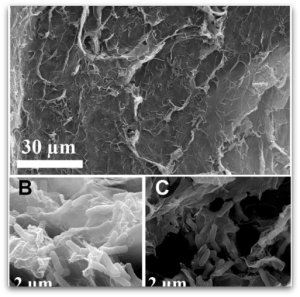
The new anode can transfer electrolytes from bacteria in wastewater to a microbial fuel cell.
Image: Science Advances
With 783 million people world-wide lacking access to clean drinking water and more than 35 percent of the world’s population without access to improved sanitation facilities, researchers are pursuing new ways to clean wastewater that is both effective and energy efficient.
An interdisciplinary team from multiple institutions in China has developed a new freestanding anode that can take harmful electrolytes form bacteria in wastewater and transfer them to a microbial fuel cell. This new process opens the door to effectively cleaning wastewater while converting waste to electricity.
The treatment of wastewater is an essential, yet energy intensive, process. While scientists have been exploring new ways to treat wastewater, none of the option has been very energy efficient.
Many current wastewater treatment plants function through fermentation and the burning of methane. The research team from China opts for an alternative method, where they create sewage-based fuel cells that pull the bacterial electrolytes and create electricity.


